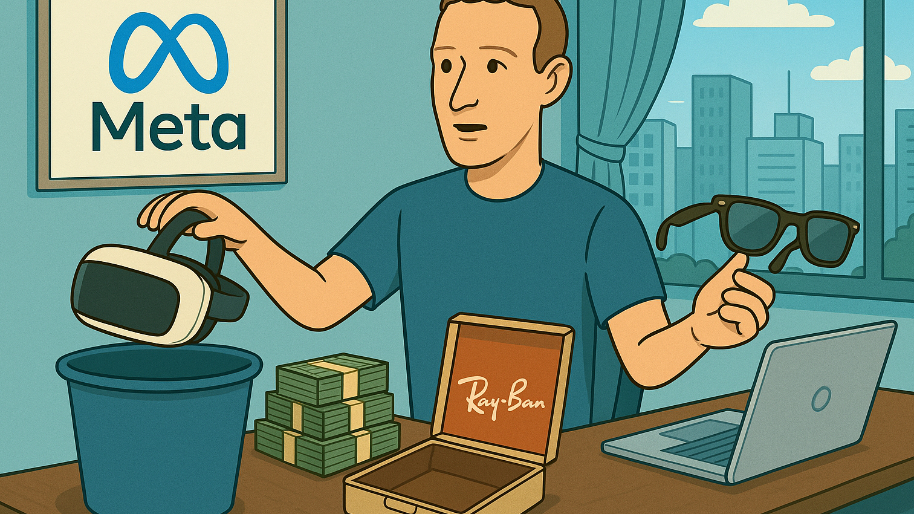Not too long ago, Mark Zuckerberg had a dream. A Ready Player One-inspired dream where we’d all log into a virtual world as legless cartoon characters and spend our lives sipping fake lattes in fake coffee shops next to fake coworkers we also didn’t like in real life. You know, for productivity (and our mental health).
Zuck was so convinced this was the future, he threw nearly half of Meta’s 2021 revenue (its highest-grossing year ever) into the Metaverse black hole, aka Reality Labs. The only problem is nobody wanted it. Consumers weren’t ready to strap a sweaty headset to their face for hours a day. Businesses weren’t lining up to host Zoom calls in Horizon Worlds. And developers weren’t exactly thrilled to build content for a platform that had fewer monthly users than a small-town library app.
By late 2024, Reality Labs had racked up $42 billion in losses, and Meta's own employees reportedly barely used the VR platform they built. Wall Street was starting to treat Zuck’s VR obsession the same way my mom treats my crypto investments… politely concerned (it’s just for fun, don’t worry).
So after a couple of years of coping, Zuck finally took off the headset and walked outside. Into the sunlight. Where he apparently had a lightbulb moment. Which brings us to today… This morning, it was reported that Meta just spent $3.5 billion to buy just under a 3% stake in EssilorLuxottica… the global eyewear giant behind Ray-Ban, Oakley, and even Prada’s eyewear line. Yes, the same company responsible for every dad’s go-to vacation sunglasses is now a cornerstone of Meta’s new strategy. And weirdly, it kind of makes sense.
Back in 2023, Meta and Ray-Ban launched their second-gen smart glasses. Unlike the clunky VR headsets gathering dust in the garage, these actually looked like real sunglasses. They had a 12MP camera, Meta’s voice assistant baked in, and AI features that could do things like identify buildings you’re looking at or pull up recipes just by staring at a tomato. (No, seriously. That’s a thing now.)
(Source: Reuters)
To date, they’ve sold about two million pairs. That’s not iPhone territory, but compared to Horizon Worlds, it’s a full-blown success story. Meta is aiming to sell 10 million units by 2026, and now that they’ve bought into the parent company, they’re planning to expand the lineup. Oakley and Prada smart glasses are apparently next.
Zuckerberg’s new thesis is that AI combined with wearables (not VR) is the future of computing. He recently said, “By the end of the decade, people will talk to AIs frequently throughout the day using smart glasses.” That might’ve sounded crazy a few years ago, but now? Honestly, it’s not that far-fetched.
Smart glasses don’t require a complete behavioral shift. People already wear sunglasses. They’re already yelling at Alexa and Siri to order paper towels or remind them to take their meds. The leap from AirPods to Ray-Bans that talk back is way smaller than the leap from Instagram to floating around in a digital office with no legs.
And from a business perspective, the deal is sharp. By owning a slice of EssilorLuxottica, Meta instantly taps into global distribution, world-class manufacturing, and decades of brand credibility. That’s a much smarter path than trying to build an entire hardware ecosystem from scratch. Plus, let’s be honest… if Meta ever tried to make its own glasses brand, you’d end up with something that looked like a cross between a gas station pair of readers and a VR headset for toddlers.
But of course, not everything is sunshine and UV-protected rainbows. Reality Labs is still losing money at a terrifying rate… $17.7 billion last year alone. That financial black hole didn’t close just because Zuck took off the headset. And competition is heating up. Apple’s working on its own smart glasses, Google is still in the game, and a dozen Chinese tech firms are looking to undercut everyone as we speak.
And then there’s the big one: privacy. These aren’t just sunglasses. They record. They identify people. They process real-time data. That might sound cool to a tourist in Times Square. But to regulators, it’s a red flag factory. If Meta thinks it’s going to sneak these past lawmakers without pushback, they haven’t been paying attention to literally any tech headline in the last five years.
Still, despite the challenges, this Ray-Ban deal might be the first thing Meta’s done in years that feels grounded in reality… pun fully intended. After spending nearly a decade trying to sell us a digital universe that required a headset, a neck brace, and a therapist, Zuck’s finally building something most people would actually use in real life.
If Meta plays this right, this might be the company's best shot at turning AI into something useful instead of unsettling.
At the time of publishing this article, Stocks.News holds positions in Meta, Apple, and Google as mentioned in the article.
Did you find this insightful?
Bad
Just Okay
Amazing
Disclaimer: Information provided is for informational purposes only, not investment advice. We do not recommend buying or selling stocks. Stock price discussions are based on publicly available data. Readers should conduct their own research or consult a financial advisor before investing. Owners of this site have current positions in stocks mentioned thru out the site, Please Read Full Disclaimer for details Here https://app.stocks.news/page/disclaimer
